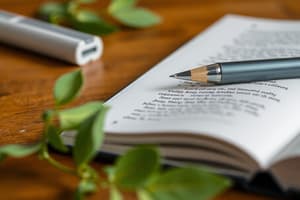Podcast
Questions and Answers
Which of the following best describes the fundamental purpose of an essay?
Which of the following best describes the fundamental purpose of an essay?
- To develop an idea, opinion, or debate into a structured and supported piece of writing. (correct)
- To narrate a personal experience in a compelling and engaging manner.
- To present a collection of facts and figures on a specific subject.
- To summarize existing research and literature without adding original analysis.
Before beginning to write an essay, why is it crucial for a writer to clearly understand the essay's primary goal?
Before beginning to write an essay, why is it crucial for a writer to clearly understand the essay's primary goal?
- To ensure the topic aligns with the writer's personal interests.
- To determine the required word count and formatting style.
- To predict the audience's expectations and tailor the language accordingly.
- To guide the selection of appropriate evidence and structure the argument effectively. (correct)
In time-constrained essay writing situations, like exams, what is the most significant challenge regarding topic selection?
In time-constrained essay writing situations, like exams, what is the most significant challenge regarding topic selection?
- Ensuring the topic is sufficiently broad to allow for extensive writing.
- Finding a topic that has readily available research materials within the exam setting.
- Confirming the topic is relevant to current events and societal trends.
- The potential lack of pre-existing familiarity or passion for the assigned topic. (correct)
What is the most critical reason for conducting thorough research before writing an essay, even on a familiar topic?
What is the most critical reason for conducting thorough research before writing an essay, even on a familiar topic?
How does a well-defined thesis statement primarily function within the structure of an essay?
How does a well-defined thesis statement primarily function within the structure of an essay?
Flashcards
What is an essay?
What is an essay?
A piece of writing that develops an idea, opinion, or debate into a cohesive structure using details, evidence, facts, and analysis.
Essay's main purpose
Essay's main purpose
To persuade or inform readers on a topic.
Initial Essay Setup
Initial Essay Setup
Ensuring the essay's goal is clear, picking a familiar topic, research, create a thesis statement, and outline the essay.
Thesis Statement
Thesis Statement
Signup and view all the flashcards
Essay Outline
Essay Outline
Signup and view all the flashcards
Study Notes
- An essay develops an idea, opinion, or debate into a cohesive structure using details, evidence, facts, and analysis.
- Essays can either inform readers on a topic or persuade them to believe or do something.
- Essays follow a similar structure regardless of length.
Essay Setup Tips
- Ensure the essay's goal is clear to either persuade or inform.
- Choose a familiar or interesting topic to avoid extensive research.
- Research thoroughly to prevent false information.
- Create a thesis statement that serves as the main argument or central theme.
- Outline the essay to provide a blueprint for writing.
Writing Essays Quickly
- Understanding the essay prompt is essential for tests and exams.
- Reread the prompt to clarify the outcome and intent.
- Determine if the prompt requires information or an argument.
- Pick the most comfortable side to argue if the prompt requires a specific stance.
- If the prompt is narrative and the writer lacks experience, create convincing fiction.
Writing Thesis Statements
- The thesis is the central argument or main point of information.
- A thesis statement differs from the prompt, as the prompt is broader.
- Example prompt: "During the 2020 pandemic, did businesses violate customer rights by refusing service to customers not wearing masks?"
- Example thesis: "Privately owned businesses have the right to serve or not serve any customer; therefore, businesses had the right to ask customers to leave for not wearing a mask."
- Example prompt: "What job industry will be most affected in the next five years due to technological automation?"
- Example thesis: "Technology will soon have the most significant impact on the retail industry as people will lose jobs to automation."
Outlining Major Points
- Outlining builds the essay's structure.
- Leave the introduction and conclusion for last.
- Start with the thesis statement at the top of the outline.
- Create three to five numerals for each paragraph.
- Write a topic sentence for each paragraph, representing a major detail of the thesis.
- Include three to six bullet points under each topic sentence to detail the paragraph's topic.
Writing the Introduction and Conclusion
- Write the conclusion and introduction paragraphs after the body.
- Introduction and conclusion paragraphs summarize the significant points.
- Restate topic sentences from the body paragraphs with transition words in the introduction.
- Summarize main points in a single sentence in the conclusion, followed by a restatement of the thesis.
- The essay's final sentence should leave a lasting impression.
- Call to Action: Instruct readers on what to do with the information, such as urging them to contact state congressmen.
- Change of Mind: Persuade the reader to reconsider their position on the topic.
- Shock and Awe: Conclude with an extraordinary fact or prediction. For example, predicting that 80% of semi-trucks will be fully automatic by 2035.
Essay Editing Tips
- Finishing an essay is almost as important as writing it.
- Proofread to avoid grammatical errors that can diminish the essay's impact and score.
- Read the essay slowly, word-by-word, to check for spelling and grammar errors.
- Ensure that the essay makes sense, details connect, and it supports the thesis.
- Ensure handwriting is legible and easy to read.
Studying That Suits You
Use AI to generate personalized quizzes and flashcards to suit your learning preferences.




